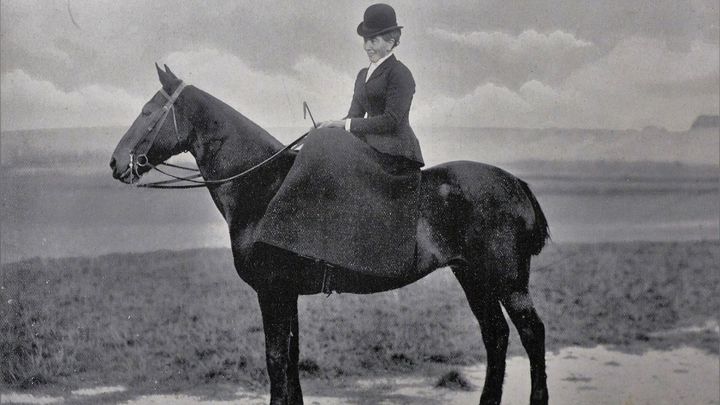
A headstone for racing pioneer Ellen Chaloner
We are the descendants of Ellen Chaloner, the trailblazing trainer who became the first woman to be given a permit to train horses by the Jockey Club in 1886 and a year later tasted success at Royal Ascot when her filly Jersey Lily won the Triennial Stakes.
Sadly, she is a forgotten woman in the world of British racing, and we wish to restore recognition for one of its unique and forgotten pioneers.
Ellen, along with other members of a horse-racing dynasty, is buried in two unmarked graves at Newmarket cemetery just across the road from the Rowley Mile racecourses where some of her horses would have run at the end of the 19th century.

Sadly, she is a forgotten woman in the world of British racing, and we wish to restore recognition for one of its unique and forgotten pioneers.
Ellen, along with other members of a horse-racing dynasty, is buried in two unmarked graves at Newmarket cemetery just across the road from the Rowley Mile racecourses where some of her horses would have run at the end of the 19th century.

“It is sad that the British Racing World has almost forgotten this famous woman. I now plan to make every effort to succeed in my campaign to honour her with recognition of a stone placed on her grave,” says Marietta, Ellen's great granddaughter.
Charlie Swan, the former nine-time Irish champion jump jockey of Istabraq fame and the great great grandson of Ellen Chaloner, is right behind the campaign.
Ellen was part of a legendary horse racing family. Her father Johnny Osborne Senior was a trainer in Yorkshire, her brother Johnny Osborne Jnr was a twelve-time classic winning jockey who won the Derby in 1869; while her husband Tom was a classic winning jockey who also won the Derby at Epsom in 1863 on Macaroni. Macaroni was trained by James Godding at Palace House stables in Newmarket, now the home of the National Horse Racing Museum.
Steeped in racing, Ellen took over training horses from her husband Tom, who had trained the winner of the 1884 2000 Guineas, after he died at only 46 in 1886. Official licenses did not come into force until the early part of the twentieth century, but The Jockey Club granted her a permit to train horses on the heath, effectively a license to train horses.
“I couldn’t begin to imagine the stumbling blocks a woman would have had to be accepted as a racehorse trainer in the 1880s,” says Newmarket-based trainer Gay Kelleway, who as a jockey became the first woman to ride a winner at Royal Ascot in 1987.
Research by Dr Esther Harper – who completed a PHD in the history of horse racing when she worked at the National Horse Racing Museum between 2013 and 2017 – confirmed that the 1891 census recorded Ellen’s profession as a trainer of racehorses. So, too were two of her sons (she had seven) and her only daughter living with her. Three stable men, three other apprentice jockeys and a domestic servant were all working for her at Osborne House. In 1893 Ellen was training seventeen horses. Osborne House is now the overflow yard for Group 1 winning trainer Sir Mark Prescott at Heath House stables. “When you consider the number of people who reported to her and the number of horses she was responsible for, it was quite a significant business she was running,” says Dr Harper.
Ellen retired in from training 1894, and one of her sons took over at Osborne House – but we know she remained active in Newmarket well into her nineties. Ellen was a regular racegoer and highly respected in the Suffolk town. “She is clearly a well-known and respected figure, and the sales and buyers would ask her opinion on yearlings and broodmares,” says Dr Harper.
A high court case, eighty years after Ellen began training, officially gave women the right to train racehorses in Britain – The Jockey Club finally recognising the claims of Florence Nagle and Norah Wilmot.
Since 1966, women trainers have gone on to win some of the major races in this country, particularly in the National Hunt game. Jenny Pitman becoming the first to win the Grand National with Corbiere in 1983, a feat she repeated in 1995. Venetia Williams, Sue Smith and Lucinda Russell, who helped with ‘The Paddock and The Pavilion podcast’ have all since trained the winner of the world’s most famous race. Glory has also followed in the Cheltenham Gold Cup with Jenny Pitman winning in 1984 and 1991, while Henrietta Knight won the race on three successive occasions with Best Mate in the 21st century.
But there is no mistaking that Ellen Chaloner was the first woman trainer in 1886.
“It’s semi worrying that an encyclopaedia of British horse racing doesn’t mention her but concentrates on the court case of 1966. I think she deserves significantly more recognition than she gets” says racing historian Tim Cox.
Surely this campaign will correct that mistake in the racing records and promote more research on the trailblazing trainer who tasted success at Royal Ascot.
Our hope for this fundraising campaign is to erect a proper headstone for Ellen at Newmarket cemetery.
Please donate what you can. The more we raise, the more prominent a headstone we can install in honour of this inspirational and remarkable woman.
Co-organizers4
Justin Chaloner
Organizer
Wales
George Chaloner
Beneficiary
Leo Krikhaar
Co-organizer
Charlie Swan
Co-organizer
Susie Wilks
Co-organizer